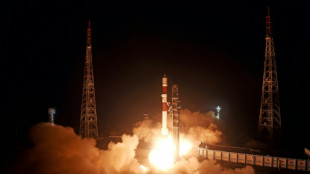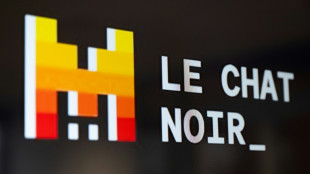
-
 South Korea's president arrest: what happens next?
South Korea's president arrest: what happens next?
-
Blue Origin's New Glenn rocket blasts off in first launch, reaches orbit

-
 Chinese give guarded welcome to spending subsidies
Chinese give guarded welcome to spending subsidies
-
World Bank plans $20 bn payout for Pakistan over coming decade

-
 Indian Bollywood star Saif Ali Khan stabbed in burglary
Indian Bollywood star Saif Ali Khan stabbed in burglary
-
Taiwan's TSMC says net profit rose 57% in fourth quarter

-
 India achieves 'historic' space docking mission
India achieves 'historic' space docking mission
-
South Korea's Yoon avoids fresh questioning after dramatic arrest

-
 Olympic push for kho kho, India's ancient tag sport
Olympic push for kho kho, India's ancient tag sport
-
Dangerous Fritz sets up Monfils clash at Australian Open

-
 AFP photographer's search for his mother in the Nazi camps
AFP photographer's search for his mother in the Nazi camps
-
Life after the unthinkable: Shoah survivors who began again in Israel

-
 Israeli cabinet to vote on Gaza ceasefire deal
Israeli cabinet to vote on Gaza ceasefire deal
-
Jabeur finds it 'hard to breathe' as asthma flares up in Melbourne

-
 Swiatek powers on as Sinner, Medevedev top men's Melbourne bill
Swiatek powers on as Sinner, Medevedev top men's Melbourne bill
-
Nintendo rumour mill in overdrive over new Switch

-
 Biden warns of Trump 'oligarchy' in dark farewell speech
Biden warns of Trump 'oligarchy' in dark farewell speech
-
Superb Swiatek sets up Raducanu showdown at Australian Open

-
 Asian stocks follow Wall St higher on welcome US inflation data
Asian stocks follow Wall St higher on welcome US inflation data
-
Toyota arm Hino makes deal to settle emission fraud case

-
 Fire-wrecked Los Angeles gets a break as winds drop
Fire-wrecked Los Angeles gets a break as winds drop
-
Superb Swiatek races into third round at Australian Open

-
 Biden warns of dangerous 'oligarchy' in dark farewell speech
Biden warns of dangerous 'oligarchy' in dark farewell speech
-
Herbicide under US scrutiny over potential Parkinson's link

-
 South Korea's Yoon to avoid fresh questioning after dramatic arrest
South Korea's Yoon to avoid fresh questioning after dramatic arrest
-
Behind the Gaza deal: a US odd couple and last-minute snags

-
 Noisy racket on Australian Open 'party court' forces match move
Noisy racket on Australian Open 'party court' forces match move
-
AFP strikes deal for France's Mistral AI to use news articles

-
 'Sensational' Arsenal back in title race: Arteta
'Sensational' Arsenal back in title race: Arteta
-
Survivors count the mental cost of Los Angeles fires

-
 Arsenal reignite Premier League title charge as Isak stars again
Arsenal reignite Premier League title charge as Isak stars again
-
Thousands across Gaza celebrate ceasefire deal

-
 Postecoglou slams 'nowhere near good enough' Spurs after Arsenal defeat
Postecoglou slams 'nowhere near good enough' Spurs after Arsenal defeat
-
Moyes 'under no illusions' after defeat on Everton return

-
 Arsenal reignite Premier League title hopes as Isak stars again
Arsenal reignite Premier League title hopes as Isak stars again
-
Yamal drives dominant Barca past Betis into Copa del Rey quarters

-
 Arsenal fightback sinks Spurs to ignite title bid
Arsenal fightback sinks Spurs to ignite title bid
-
Qatar, US announce Gaza truce, hostage release deal

-
 US consumer inflation rises in December but underlying pressures ease
US consumer inflation rises in December but underlying pressures ease
-
McGregor accused of sexual assault in civil suit

-
 Inter's title defence slowed by draw with spirited Bologna
Inter's title defence slowed by draw with spirited Bologna
-
Isak fires Newcastle into Premier League top four, Moyes misery

-
 Sane hits brace as Bayern thump Hoffenheim
Sane hits brace as Bayern thump Hoffenheim
-
Aston Villa ruin Moyes' Everton return

-
 Norman replaced as CEO of LIV Golf
Norman replaced as CEO of LIV Golf
-
SpaceX delays latest Starship megarocket test to Thursday

-
 Quake-stricken Vanuatu heads to polls in snap election
Quake-stricken Vanuatu heads to polls in snap election
-
Qatar, US announce Gaza truce, hostage release deal agreed

-
 Galaxy sign Zanka from Anderlecht
Galaxy sign Zanka from Anderlecht
-
Police probe abuse of Havertz's wife after Arsenal star's woes


Olympic push for kho kho, India's ancient tag sport
The ancient game of kho kho is enjoying a resurgence in India, with organisers of the first international tournament hoping their efforts will secure the sport's place in the Olympics.
Kho kho, a catch-me-if-you-can tag sport, has been played for more than 2,000 years across southern Asia but only saw its rules formalised in the early 20th century.
It was played as a demonstration sport at the 1936 Olympics in Berlin but did not gather enough support to be included in the Summer Games and since then has been largely eclipsed by India's ferocious love of cricket.
Nearly a century later, enthusiasts have sought to raise its profile with the inaugural Kho Kho World Cup featuring teams from 23 nations competing in India's capital New Delhi.
The tournament's opening ceremony saw a gala of song, dance and an Olympic-style team parade, reflecting the aspirations of organisers and athletes to take the sport global.
"My elder sister played the sport, but was not able to pursue her dreams," Indian women's team player Nasreen Shaikh, 26, told AFP.
"We have crossed the first barrier of playing in a World Cup. The next big step would be an entry in the Olympics."
Kho kho is traditionally played outside on a rectangular court, divided in two by a line that connects two poles at either end of the field.
Teams switch between attack and defence, with the former chasing and tagging defending players around the field.
Only one player can give chase at a time and attacking players can only move in one direction around the court, forcing them to tag in team-mates crouched on the centre line to take over pursuit.
The match is won by whichever team can gain the most points, primarily by tagging defenders faster than the opposing team.
- 'Mud to mat' -
The franchise-based Ultimate Kho Kho League, founded in 2022, brought the sport off grassy fields and onto indoor mats, also boosting its profile with a television audience.
Since then the league has become the third most-watched non-cricket sports tournament in the world's most populous country after the Pro Kabaddi League -- another ancient Indian tag sport -- and the Indian Super League football competition.
"The turning point was when it transitioned from mud to mat. It made it into a global game," Kho Kho Federation of India president Sudhanshu Mittal told AFP.
"Today we are in 55 countries... Native players in countries like Germany, Brazil, and Kenya are embracing the game because of its speed, agility and minimal equipment required."
Mittal said he expected the sport to gain a foothold in dozens more countries by the end of the year, giving it a strong claim to be featured in the Olympics in the coming decade.
That would coincide with India's audacious bid to host the 2036 Games in the city of Ahmedabad, 100 years after kho kho last appeared at the Olympics.
The United States, England and Australia are among the nations competing in this week's World Cup in New Delhi, with expatriate Indians heavily represented after taking the game to foreign shores.
But Pakistan is a glaring omission from the competition despite the sport being popular there -- a reflection of the deep animosity between the nuclear-armed archrivals.
World Cup organisers have refused to comment on the absence, which has failed to dim the sense of optimism at this week's competition that the sport is destined to thrive.
"There has been a sea change in the sport," Indian men's team captain Pratik Waikar, 32, told AFP.
"Cricket has a rich history and they developed it well by going live on TV, and now our sport has also gone live," he said. "In the next five years it will be on another level."
P.Anderson--BTB
